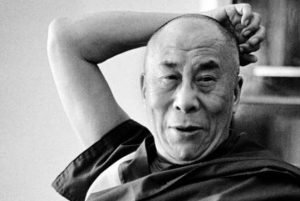
Along with death, the purpose of the individual is a returning question in philosophy and an overriding concern in all religions. Even the contemporary idea of “spirituality” hinges around discovering or creating some idea of direction that aims not for the worldly, but for the supramundane. Are we simply here to have a good time and mark the days we had a good party, a fast car, a nice family, and then drop dead? Do we only need to tick off the days we spend until we reach the end and wonder, “Is this it? Is this all?” Religion and spirituality obviously give a negative answer to this and orient its practitioners and believers toward a transcendent vision that is beyond the concerns of politics, business, or materialism.
We hear in many religious circles the common complaint that it is difficult to talk about spiritual things in social situations. I am not sure if we might sometimes be a bit unskilful, condescending or moralizing, but there is certainly a grain of truth in the complaint: contemplating our ultimate purpose is not always acceptable in public discourse because it can be uncomfortable, challenging, and thought-provoking. And of course, questions that are concerned with human suffering will always lend some degree of solemnity or seriousness to any discussion. And that is not acceptable to those who are uncomfortable with confronting the bigger issues.
Buddhism, in its traditional and contemporary methods of practice, shares the concern about purpose with other religions. But even as it asks “What is the purpose of life?”, it is also asking “What can we do about suffering?” It posits suffering as a brute fact (presupposing that suffering is undesirable to all), something that humans must learn not to run away or bury their heads in the sand from. Buddhism is realistic in this sense that from the outset, the First Noble Truth, it insists upon the reality of this world’s suffering, and it is not to be dismissed as some gloomy fixation by unhappy monks. Should one not be mature enough to accept that suffering is a very real and universal thing, one cannot be considered a Buddhist. Bhante H. Gunaratana expresses this approach perfectly:
“When you think of it, it is so frightening – that’s why people say Buddhism is pessimistic. Buddhism speaks the truth. Buddha did not stop there. He said we must understand this as adults, accept and understand it. When animals have these things, they are always anxious and they are in misery. They don’t know anything about it. We don’t want to be like that. We want to be intelligent, adult, matured responsible human beings so we say, yes it is there. We don’t want to run away from it. We want to face it and then what?” (Four Noble Truths, 1996)
On the positive side, if these two questions are asked together, then we already begin to see an orientation towards a specific goal: the purpose of life is to remove suffering as conceived of by the Buddha. But is this just for our sake, or for others? For the Enlightened One, it was obvious: he loved all beings with a sacred intensity, so he declared that his mission and those who chose to follow this mission would do it for the benefit of all beings. The Buddha loves and knows sentient beings better than they love and know themselves. As such, the question of the purpose in Buddhism is slowly becoming clearer: by working to remove suffering for other beings, we also remove suffering for ourselves.
In Mah?y?na Buddhism, the purpose in life is very clearly the liberation of all beings through wisdom and compassion. From the very beginning, the Buddha universalized the condition of suffering for not just humans, but other sentient beings. Accepting the reality of suffering, in other words, also involves accepting a lofty and beautiful call to identify with all beings as ultimately one with the Buddha’s love and Nirv?na itself. This sense of interconnectedness, interdependence and unity with the supramundane is particularly celebrated in the Avatamsaka Sutra, wherein each atom reflects a universe, and one being reflects a Buddha. Developing this all-embracing and tolerant vision for the world is, in my understanding, vital to the cultivation of Buddhist virtue and engagement with others. If one can love all beings like the Buddha, then we come full circle and end up asking a different question: what purpose does chasing after impermanent and contingent things serve (aside for practical uses)?
Buddhism does not profess to change the world overnight. It simply switches perspectives for an individual, replacing a mundane one with a freer, more open and moral one. The Buddhist purpose of life is fundamentally a moral and ethical one, and it is shared with all beings in the same way the Buddha loves all beings.
Artwork by Dharmachari Aloka.







